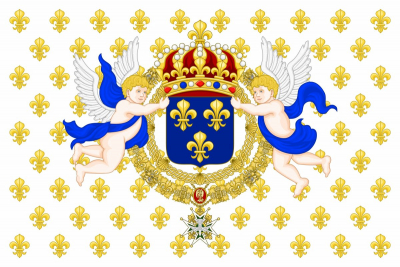The Battle of Noin or the Battle of Esquiroz, fought on June 30, 1521 was the only open field battle in the Spanish conquest of Iberian Navarre. It was a decisive victory for the Spanish against the Franco-Navarrese army.
The Kingdom of France (Old French: Reaume de France; Middle French: Royaulme de France; French: Royaume de France) is the historiographical name or umbrella term given to various political entities of France in the medieval and early modern period. It was among the most powerful states in Europe and a great power from the High Middle Ages onward. It was also an early colonial power, with possessions around the world.
France originated as West Francia (Francia Occidentalis), the western half of the Carolingian Empire, with the Treaty of Verdun (843). A branch of the Carolingian dynasty continued to rule until 987, when Hugh Capet was elected king and founded the Capetian dynasty. The territory remained known as Francia and its ruler as rex Francorum ("king of the Franks") well into the High Middle Ages. The first king calling himself rex Francie ("King of France") was Philip II, in 1190, and officially from 1204. From then, France was continuously ruled by the Capetians and their cadet lines—the Valois and Bourbon—until the monarchy was abolished in 1792 during the French Revolution. The Kingdom of France was also ruled in personal union with the Kingdom of Navarre over two time periods, 1284–1328 and 1572–1620, after which the institutions of Navarre were abolished and it was fully annexed by France (though the King of France continued to use the title "King of Navarre" through the end of the monarchy).
France in the Middle Ages was a de-centralised, feudal monarchy. In Brittany and Catalonia (now a part of Spain) the authority of the French king was barely felt. Lorraine and Provence were states of the Holy Roman Empire and not yet a part of France. Initially, West Frankish kings were elected by the secular and ecclesiastic magnates, but the regular coronation of the eldest son of the reigning king during his father's lifetime established the principle of male primogeniture, which became codified in the Salic law. During the Late Middle Ages, rivalry between the Capetian Dynasty, rulers of the Kingdom of France and their vassals the House of Plantagenet, who also ruled the Kingdom of England as part of their so-called competing Angevin Empire, resulted in many armed struggles. The most notorious of them all are the series of conflicts known as the Hundred Years' War (1337–1453) in which the kings of England laid claim to the French throne. Emerging victorious from said conflicts, France subsequently sought to extend its influence into Italy, but was defeated by Spain and the Holy Roman Empire in the ensuing Italian Wars (1494–1559).
France in the early modern era was increasingly centralised; the French language began to displace other languages from official use, and the monarch expanded his absolute power, albeit in an administrative system (the Ancien Régime) complicated by historic and regional irregularities in taxation, legal, judicial, and ecclesiastic divisions, and local prerogatives. Religiously France became divided between the Catholic majority and a Protestant minority, the Huguenots, which led to a series of civil wars, the Wars of Religion (1562–1598). The Wars of Religion crippled France, but triumph over Spain and the Habsburg Monarchy in the Thirty Years' War made France the most powerful nation on the continent once more. The kingdom became Europe's dominant cultural, political and military power in the 17th century under Louis XIV. In parallel, France developed its first colonial empire in Asia, Africa, and in the Americas. From the 16th to the 17th centuries, the First French colonial empire stretched from a total area at its peak in 1680 to over 10,000,000 square kilometres (3,900,000 sq mi), the second largest empire in the world at the time behind only the Spanish Empire. Colonial conflicts with Great Britain led to the loss of much of its North American holdings by 1763. French intervention in the American Revolutionary War helped secure the independence of the new United States of America but was costly and achieved little for France.
The Kingdom of France adopted a written constitution in 1791, but the Kingdom was abolished a year later and replaced with the First French Republic. The monarchy was restored by the other great powers in 1814 and lasted (except for the Hundred Days in 1815) until the French Revolution of 1848.

1521Jun, 30
Spanish forces defeat a combined French and Navarrese army at the Battle of Noáin during the Spanish conquest of Iberian Navarre.
Choose Another Date
Events on 1521
- 7Apr
Cebu (island)
Ferdinand Magellan arrives at Cebu. - 17Apr
Diet of Worms
Trial of Martin Luther over his teachings begins during the assembly of the Diet of Worms. Initially intimidated, he asks for time to reflect before answering and is given a stay of one day. - 27Apr
Ferdinand Magellan
Battle of Mactan: Explorer Ferdinand Magellan is killed by natives in the Philippines led by chief Lapu-Lapu. - 23Aug
Gustav I of Sweden
Christian II of Denmark is deposed as king of Sweden and Gustav Vasa is elected regent. - 29Aug
Nándorfehérvár
The Ottoman Turks capture Nándorfehérvár (Belgrade).

 English
English  español
español  français
français  português
português  русский
русский  العربية
العربية  简体中文
简体中文 